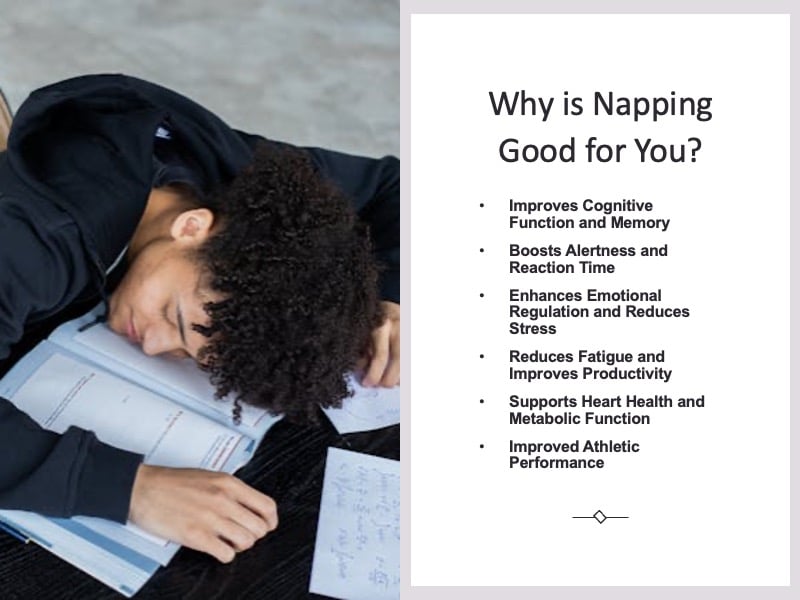Benefits of Taking a Nap: Is Taking Naps Good for You?
Napping is often seen as a luxury, but for many high-performing individuals—including athletes, world leaders, and intellectuals—strategic naps have been a key to success.
From Aristotle and Leonardo da Vinci to Winston Churchill and Albert Einstein, history is filled with brilliant minds who relied on naps to sustain their creativity, focus, and energy.
As a professional basketball player who has balanced the demands of elite competition, NCAA Division I academics, and a master’s degree in Nutrition Education, I have firsthand experience with the power of naps in boosting cognitive and physical performance.
Science supports this practice, demonstrating that napping can improve memory, alertness, emotional regulation, and even athletic performance.
If you are wondering whether or not taking a nap is good for you, I certainly believe so!
The evidence supports this position, and you can read below to learn why!
The Science Behind Napping: Why is Napping Good for You?
Napping is good for you as it triggers a cascade of physiological processes that restore brain function, regulate hormones, and enhance overall body recovery.
It facilitates memory consolidation by activating the hippocampus while increasing prefrontal cortex activity to improve executive function and decision-making.
Naps also help clear adenosine, reducing fatigue and promoting alertness, while boosting dopamine and serotonin levels to enhance mood and stress resilience.
Physiologically, napping regulates cortisol, lowering stress and inflammation, while longer naps (60–90 minutes) stimulate human growth hormone (HGH) release for muscle repair and immune function.
Cardiovascular benefits include lower blood pressure and improved metabolic function, reducing risks for conditions like diabetes.
Athletes, in particular, benefit from increased blood flow to muscles during deep sleep stages, accelerating recovery and improving endurance.
Benefits of Taking a Nap

Napping is more than just a way to catch up on lost sleep—it’s a powerful tool for enhancing cognitive function, emotional well-being, and physical performance.
Whether you need a quick mental boost or deep recovery, a well-timed nap can significantly improve daily productivity and overall health.
Improves Cognitive Function and Memory
Naps play a vital role in learning and memory consolidation.
Research shows that even short naps enhance executive function, problem-solving skills, and information retention (Mantua & Spencer, 2017).
A study published in Sleep found that a 30-minute nap improves memory encoding, making it easier to retain and recall new information (Leong et al., 2023).
This benefit is particularly valuable for students, professionals, and athletes who rely on quick decision-making and strategic thinking.
My own experience as a professional athlete and student confirms this—strategic naps helped me absorb complex information while balancing NCAA Division I academics and basketball.
Boosts Alertness and Reaction Time
One of the most immediate benefits of a nap is increased alertness.
Studies indicate that even a 10-minute power nap can significantly enhance reaction time, making it a valuable tool for high-performance individuals, including athletes and military personnel.
For those in physically demanding professions, such as professional sports, napping improves split-second decision-making and reaction times.
As a basketball player, I’ve used naps to stay sharp during evening games and practices, where maintaining focus under pressure is crucial.
Enhances Emotional Regulation and Reduces Stress
Naps help regulate emotions by reducing cortisol (the stress hormone) and improving mood stability.
Research has found that napping lowers stress levels and enhances emotional resilience, making it an effective strategy for handling high-pressure situations.
Many famous leaders, such as Winston Churchill and John F. Kennedy, relied on naps to remain level-headed and make critical decisions under stress.
A short nap can provide a mental reset, helping to prevent burnout and emotional exhaustion.
Reduces Fatigue and Improves Productivity
A midday nap can combat fatigue more effectively than caffeine.
Research in Behavioral Brain Research (2008) compared naps, caffeine, and placebo on cognitive function and found that napping outperformed caffeine in verbal memory, motor skills, and perceptual learning.
Additionally, a meta-analysis in the British Journal of Sports Medicine (2023) examined 22 trials on napping and found that a 30–60 minute nap significantly improved cognitive and physical performance while reducing fatigue.
For those who work long hours or struggle with afternoon drowsiness, a strategic nap can restore energy levels and increase productivity without the crash associated with caffeine.
Supports Heart Health and Metabolic Function
While excessive napping in older adults has been linked to health concerns, research suggests that people who nap occasionally have lower blood pressure than those who don’t nap at all.
Additionally, naps can help regulate blood sugar levels, reducing the risk of metabolic disorders like diabetes.
This makes napping particularly beneficial for individuals with demanding lifestyles who may struggle to get sufficient nighttime sleep.
Improved Athletic Performance
For athletes, naps can serve as a strategic tool to optimize recovery and performance.
Studies suggest that a 90-minute nap is optimal for athletes, improving both cognitive and physical performance (Souabni et al., 2021).
This aligns with my personal experience—naps helped me power through training, maintain focus during games, and recover from travel fatigue.
Additionally, naps can aid in muscle recovery by promoting the release of growth hormone, which is crucial for tissue repair.
A systematic review in Sleep (2023) found that napping between 30–60 minutes enhances memory encoding, alertness, and reaction time, all essential for peak athletic performance (Leong et al., 2023).
Moreover, naps are particularly beneficial for those experiencing sleep deprivation, a common issue among professional athletes with demanding travel schedules.
Types of Naps and Their Benefits
Not all naps offer the same benefits—timing and duration play a critical role in determining their effectiveness.
Whether you need a quick energy boost, memory enhancement, or full-body recovery, choosing the right type of nap can make a significant difference.
Power Naps (10–20 Minutes)
- Best for: Instant refreshment, improved alertness, and a quick cognitive boost.
- Benefits: Enhances mood, sharpens focus, and prevents sleep inertia (Leong et al., 2023). Studies show that even a 10-minute nap can significantly improve vigilance and reaction time.
- Ideal for: Professionals, students, and athletes who need to stay sharp without feeling groggy.
Short Naps (30 Minutes)
- Best for: Enhancing memory retention and reducing mental fatigue.
- Benefits: A 30-minute nap boosts memory encoding and cognitive processing but may cause mild sleep inertia upon waking (Leong et al., 2023). This nap duration has been shown to be particularly effective for learning and creativity.
- Ideal for: Students, creatives, and professionals looking for a midday mental reset.
Long Naps (60–90 Minutes)
- Best for: Deep physical and cognitive recovery.
- Benefits: Unlike shorter naps, a 60–90-minute nap includes slow-wave and REM sleep, aiding in muscle recovery, emotional regulation, and problem-solving skills (Mantua & Spencer, 2017). It’s especially beneficial for athletes, as it enhances endurance and reduces fatigue.
- Ideal for: Athletes, shift workers, and individuals experiencing sleep deprivation or intense physical exertion.
Espresso Naps (Coffee Naps)
- Best for: Combining caffeine’s stimulating effects with the restorative power of sleep.
- Benefits: Drinking a cup of coffee before a 15–20 minute nap allows caffeine to take effect just as you wake up, maximizing alertness and reducing post-nap grogginess (Centofanti et al., 2020). Research suggests this method is particularly effective for combating drowsiness in night-shift workers and drivers.
- Ideal for: People needing an immediate energy boost, such as students, night-shift workers, and long-distance drivers.
Each type of nap serves a unique purpose—understanding their benefits can help you incorporate the right one into your daily routine for optimal performance and well-being.
Final Thoughts: Should You Take Naps Regularly?
Incorporating naps into your routine can be a game-changer for cognitive function, emotional well-being, and physical performance.
Research consistently supports the benefits of napping, from improved memory retention and reaction time to enhanced muscle recovery and stress reduction.
Whether you’re a student, athlete, or working professional, strategic naps can help counteract fatigue, optimize productivity, and improve overall health.
However, regular napping should be approached with balance.
- While short naps (10–30 minutes) provide immediate cognitive and mood benefits, excessive or poorly timed naps may interfere with nighttime sleep.
- Long naps (60–90 minutes) are best used when recovering from intense physical exertion or sleep deprivation.
If you struggle with chronic fatigue, it’s also important to assess whether naps are compensating for an underlying sleep deficiency rather than supplementing a healthy routine.
From my personal experience as a professional athlete and student, naps have been an essential tool for maintaining high energy levels and mental clarity.
If used correctly, they can be one of the most effective, science-backed strategies for sustaining peak performance and long-term well-being.
Whether you take a quick power nap or a deep recovery nap, finding the right approach for your lifestyle can help you function at your best.
This website does not provide medical advice. This website site does contain affiliate links, and purchases may earn a commission.
Read my Medical Disclaimer, Review Disclaimer, and Publishing Policies for more details. Use of this site indicates acceptance of these terms.



